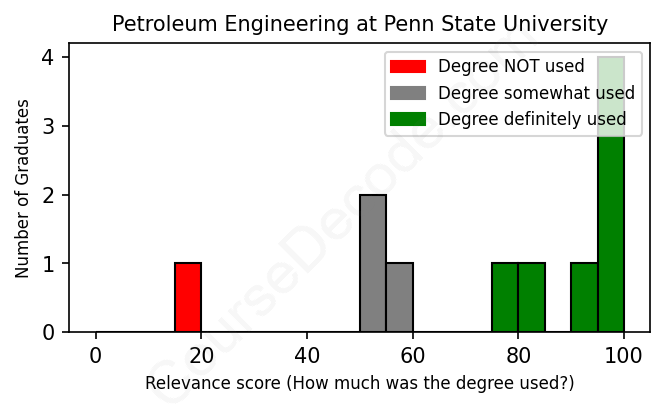
First, some facts. Of the Petroleum Engineering graduates from Penn State University we've analyzed , here's how many have used (or NOT used) their degree in their career:

These are estimates based on AI analysis of 11 LinkedIn profiles (see below).
The verdict? Above average. Overall, with an average relevance score of 75%, Petroleum Engineering graduates from Penn State University have a higher likelihood (+8%) of finding work in this field compared to the average graduate across all fields:
And for comparison, here's the chart for all profiles we've looked at across all degrees.
Also, after graduating, only 9% of these graduates have pursued further education other than another Bachelor's degree (such as a Masters degree or other), compared to the average across all profiles of 35%. This suggests a Bachelors degree is enough for most Petroleum Engineering graduates, and it's normal to look for work straight after graduation.
See the details:
|
Relevance score: 18% We think this person has NOT gone into a career related to their degree. We think this person has NOT gone into a career related to their degree.
DEGREE INFOGraduated in 2015 from Penn State University with a Bachelor's Degree in Petroleum Engineering. No other secondary education since. JOB HISTORY SINCE GRADUATIONPetroleum Engineer Bureau of Indian Affairs Mar 2016 - Oct 2017 Engineer/Foreman  Unique Constructions Oct 2017 - Present ABOUTSkilled in Pipeline Management, Government, Risk Assessment, Military Operations, and QuickBooks. Strong business development professional with a Bachelor's Degree focused in Petroleum and Natural Gas Engineering from Penn State University. |
The top 10 most common jobs done by the graduates we've analyzed (ranked most common to least) are:
When we look at the job paths of folks who studied Petroleum Engineering at Penn State University, it’s pretty clear that many of them stuck to roles that are directly tied to the oil and gas industry. Common positions include Reservoir Engineers, Field Engineers, Completions Engineers, and various roles at major companies like Schlumberger, Halliburton, and Marathon Oil. These positions require the specialized skills and knowledge gained during their degree programs, such as understanding fluid dynamics, reservoir behavior, and drilling techniques. In fact, many of these roles focus heavily on applying petroleum engineering principles, which shows that a significant number of graduates are applying what they learned in school effectively in their careers.
However, it’s also interesting to note that not every job was strictly related to petroleum engineering. Some graduates have ventured into roles like project management, sales, and even hospitality, which aren’t really relevant to their degree. For example, positions like the Managing Director at a family retreat or roles in procurement or consulting lean more towards business skills rather than the technical expertise of petroleum engineering. So while many graduates found solid, relevant positions within the engineering field, there’s a notable number who took a different route, demonstrating that a degree in petroleum engineering can open diverse doors in the job market, even if they might not lead you directly back to oil rigs or drilling sites. Overall, the majority did end up in relevant roles, but the diversity of career paths is pretty cool to see too!
Here is a visual representation of the most common words in job titles for Petroleum Engineering graduates (this is across all Petroleum Engineering graduates we've analyzed, not just those who went to Penn State University):

Graduates from Penn State's Petroleum Engineering program tend to begin their careers in positions that are directly related to the oil and gas industry, with many starting off as engineers at companies like Schlumberger, Halliburton, and Marathon Oil. For example, several of the 2011 and 2013 graduates took on roles such as Reservoir Engineer or Field Engineer right after graduation. This initial job experience seems to set a solid foundation in the field, leading many of them into more advanced engineering roles or management positions within a few years. It's worth noting that, as time goes on—about five to ten years post-graduation—many of these individuals either remain in engineering roles or transition into leadership positions, like Technical Advisor or even Founders of their own companies, suggesting a generally positive career trajectory for those who stick with the petroleum sector.
However, it's not all smooth sailing. Some graduates veer off the typical path, exploring careers outside of petroleum engineering. For instance, one graduate has become a Managing Director of a family retreat, while others have taken on roles in environmental consulting and construction management. While these roles may seem less directly related to their degree, it highlights the versatility of their education and the fact that not everyone stays in strictly engineering roles long-term. In summary, overall, while many Penn State Petroleum Engineering graduates enjoy successful careers within the field, some do pursue alternative pathways, making their career outcomes a mixed bag.
Honestly, a Bachelor’s degree in Petroleum Engineering, whether at Penn State or elsewhere, can be pretty challenging, but it really depends on your interests and strengths. You'll be diving into a lot of tough subjects like thermodynamics, fluid mechanics, and reservoir engineering, plus there’s a fair amount of math and science involved. It’s definitely more demanding than some other degrees, especially if you’re not super into physics or calculus. But if you enjoy problem-solving and have a passion for energy resources, it can also be really rewarding. Just be prepared to put in some serious study hours and collaborate with others on projects—it’s not a walk in the park, but it's definitely doable with some dedication!
Most commonly, in the LinkedIn profiles we've looked at, it takes people 4 years to finish a Bachelor degree in Petroleum Engineering.
Looking at the job trajectories of these Petroleum Engineering grads from Penn State, it's pretty clear they’ve landed some solid positions, especially considering the strength of the industry. Graduates from 2011 have climbed up the ranks at big names like Schlumberger and Marathon, typically indicative of good salary growth. The 2013 grads had a mixed bag but seem to have held steady roles in various engineering fields, which also pays decently, especially as they gain experience. The later graduates, especially those from 2018, are already advancing to managerial roles, signaling they're probably raking in a pretty nice income. Overall, it seems like they're doing well financially, carving out decent careers in a lucrative sector!
Here is a visual representation of the most common words seen in the "about" section of LinkedIn profiles who have a Bachelor degree in Petroleum Engineering (this is across all Petroleum Engineering graduates we've analyzed, not just those who went to Penn State University). This may or may not be useful:

Here are all colleges offering a Bachelor degree in Petroleum Engineering (ordered by the average relevance score of their Petroleum Engineering graduates, best to worst) where we have analyzed at least 10 of their graduates:
| College | Score | Count |
|---|---|---|
 Texas A&M University Texas A&M University
|
80 | 25 |
 Louisiana State University Louisiana State University
|
79 | 26 |
 University of Oklahoma University of Oklahoma
|
78 | 20 |
 Texas Tech University Texas Tech University
|
77 | 20 |
 Penn State University Penn State University
|
75 | 11 |
 The University of Texas at Austin The University of Texas at Austin
|
75 | 18 |
 Marietta College Marietta College
|
70 | 20 |
 Colorado School of Mines Colorado School of Mines
|
69 | 30 |
 West Virginia University West Virginia University
|
68 | 10 |
 University of Houston University of Houston
|
67 | 19 |
 University of Louisiana at Lafayette University of Louisiana at Lafayette
|
63 | 10 |